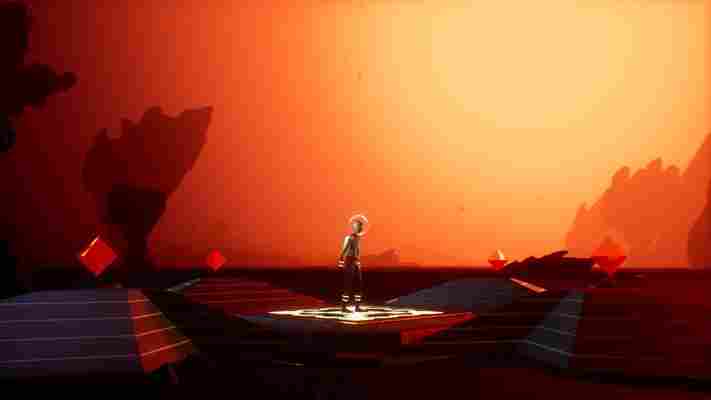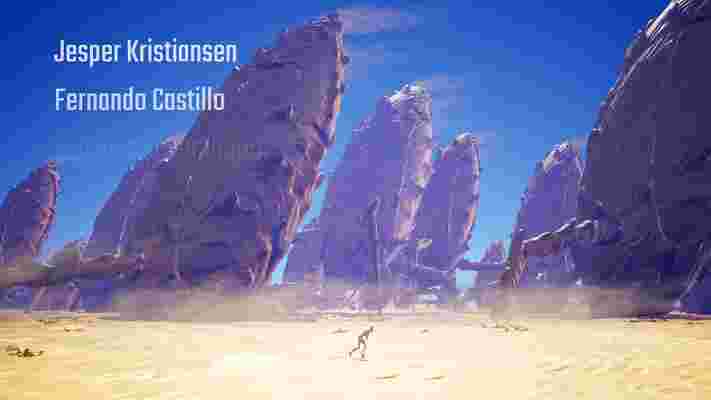In the 90s, side-scrolling adventure games were the cream of the crop, and titles were built on a simple premise; overcome enemies and obstacles to make it all the way right to the end of the level. With the advent of 3D environments and isometric perspectives, interest in side-scrollers waned over time. It was only recently that the gaming community has seen a resurgence in the classic game formula, largely on the part of indie developers looking to bring new life to the genre.
Though it fits this basic mechanic, Team 17’s Planet Alpha is more than just a side-scroller. Here’s why.

Captivating Credits:
Right from the start of the game, Team 17 clearly sets its adventure apart from other titles of its type, establishing a tone of mystery, desperation, and dread; it’s a game with an artistic personality. Rather than opening to a menu screen, players load Planet Alpha to find themselves staring at a humanoid in a retro spacesuit, standing on some sort of ancient platform on an alien world. There are no keys, no instructions, no interface, and no dialogue — just one sentient life staring forward, waiting for something to happen.

So, we just start moving to the right. And then we notice: our protagonist is limping. What happened to them? How did they get here? Where are they headed? Who is that other alien standing back there on that cliff? We aren’t told. We just keep on moving right, and the game soft cuts through a variety of barren environments, implying the passage of time as our hero (let’s call him/her the Explorer) makes the long trek forward through an alien desert. It’s ominous, artful, and engaging, all without uttering a single word of exposition.
The developer skillfully uses this introductory period to share its credits, hovering developer names softly over open areas of the screen as we watch the Explorer drag onward, finally collapsing before a cave mouth that looks suspiciously humanoid. This seems like the end of quite a long journey…

The Endless Pilgrimage:
And yet, it just goes on from there. We find our avatar lying down in a new place, jostle them awake, and then again move ever forward; the Explorer runs, walks, or jumps through beautiful, sometimes stunning settings, seamlessly blended together in a diverse and strange world. There are no load times, no more soft or hard cuts, and still never a word of dialogue an hour or more into the game. The only sounds to be heard are those around us or off in the distance, and an eerie, ethereal score that further immerses the player in the wonder and danger of this alien world.
With the exception of a few different button prompts for learning to crouch, push, and manipulate alien technology, the game relies heavily on us to figure out each puzzle, obstacle, and situation for ourselves. Softly highlighted, marked objects indicate something in the environment you can manipulate in order to progress forward. There are no verbal cues or text hints to help you, further adding to the feeling of isolation and the air of mystery the game successfully conveys at every turn.
One of the most interesting aspects of the gameplay is the importance of the day/night cycle; in particular, using nature’s day/night cycle as a means of traversing obstacles or evading enemies.
Can’t sneak past one of the game’s extremely deadly invading killer robots? You might just need it to be dark enough so the plant life to curls up its daytime blossom to form a large, person-size obstruction. Luckily, the game gives you access to powerful ancient platforms that let you manipulate the cycle itself. Over time, you use this power in new and interesting ways, each one feeling novel and unique, but never so complicated that the player is left completely in the dark (pun intended).
What a Wonderful World…
To call Planet Alpha a beautiful game is an understatement, and the art team for this title deserves high praise. Each and every environment has something interesting to look at, and while areas can appear similar, none are exactly the same.
For a game that does not attempt to communicate photorealism, every location has a distinct feeling; the creatures here are truly alive, that strange monolith in the distance is really there, the stars are actually traveling across the sky above this field, the cavern the Explorer crawls through is as vast a network as it appears.
With a visual style somewhat similar to No Man’s Sky, every setting is immersive to the point that the player feels that if they chose to, they could turn right or left and continue on through the same living world without missing a beat.
To that end, the pacing is a part of the game that most players will never notice simply because it’s so well-constructed. ‘Boss events’ — which involves puzzle solving, not fighting — don’t feel staged or abrupt. Little flavor elements of the game, such as passing through a field of huge, foraging beasts, are treated with the exact amount of grandeur, never requiring you to stop and look at the world around you unless you truly want to. And when the Explorer does finds itself unable to move forward, the player doesn’t have to travel far to find some kind of solution.
And Yet, Deadly…
Some of the game’s most valuable teaching moments are those in which the Explorer is completely and utterly obliterated by one of the game’s many and diverse hostile enemies. When the Explorer takes damage, the colorful palette of the game fades into the greyscale. Given enough time, the color will return, but often threats are so large, fast, or powerful that our avatar is quickly and hilariously snuffed out.
Thankfully, the living, breathing nature of Planet Alpha is such that you are not the only prey — indeed, some of the most satisfying moments of the game are when you have an opportunity to put your enemies in view of one another, and watch them fight while you skate past.
Sprinkling seemingly random bits of mortal danger in between vibrant, gorgeous views gives the player an experience that is somehow both leisurely and tense. When you turn the page to the next chapter, will there be a beautiful valley of floating petals, or a dark chasm of War of the World’s-inspired tripods with lasers? The game rarely gives you hints of what’s ahead, rightly realizing that that’s part of the fun. By putting the player constantly at the mercy of their own mix of uncertainty and curiosity, Team 17 keeps our interest in what’s to come, and grants us constant awareness of our own fragile insignificance.
Made with Love, Played with Love:
While many contemporary sidescrollers are fun and worth your time, it’s rare to find one as wonderfully crafted and detailed as Team 17’s Planet Alpha . The game is special; a side-scroller that keeps you often impressed, sometimes afraid and always engaged. Players looking for a casual-yet-immersive, familiar-yet-different gaming experience will find a lot to love here, and on September 4, we hope to travel to the end of the road with our courageous little Explorer.
Related Articles
10 best free to play games ever
4 sites for free retro games
10 best action games
Best video games to play with a partner
